Iran, Saudi Arabia, China Discuss Relations, Gaza War
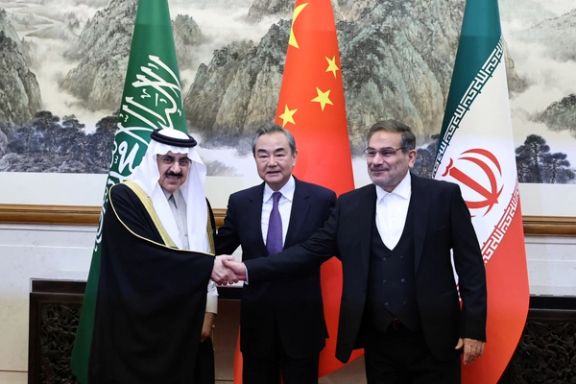
The deputy foreign ministers of Iran, Saudi Arabia, and China convened in Beijing to discuss Tehran-Riyadh relations after normalization and the ongoing Gaza war.

The deputy foreign ministers of Iran, Saudi Arabia, and China convened in Beijing to discuss Tehran-Riyadh relations after normalization and the ongoing Gaza war.
The sides evaluated the progress in reviving diplomatic ties between The Islamic Republic of Iran and Saudi Arabia that was launched in March with Chinese mediation.
According to the Saudi Arabian Press Agency, Ali Bagheri-Kani, the Political Deputy Foreign Minister of Iran, Waleed bin Abdulkarim Al-Khuraiji, the Deputy Minister of Foreign Affairs of Saudi Arabia, and Deng Li, the Vice Minister of Foreign Affairs of China, were present at the meeting.
In a statement the three sides also urged for the cessation of military operations in Gaza and the flow of "sustainable relief" to Palestinians. Iran has campaigned for an end to the Israeli military operation, which has weakened Tehran's ally Hamas.
While Iran has refrained from direct military involvement in supporting its ally Hamas and denies any role in the October 7 Hamas operation, but has faces accusations of supporting proxies like the Houthis, who have targeted US and Israeli interests, as well as international shipping.
Apart from addressing the Gaza situation, the discussions also centered on the process of reopening the embassies of both Iran and Saudi Arabia. The agenda underscored the importance of steps taken to implement the diplomatic thaw initiated in March. This agreement marked a pivotal moment after seven years of strained relations between the two nations.
While the Iranian Embassy in Saudi Arabia officially reopened in mid-June, symbolizing the restoration of diplomatic ties, the formal opening of the Saudi Embassy in Tehran has faced repeated delays, with no official explanation from Saudi authorities as yet.
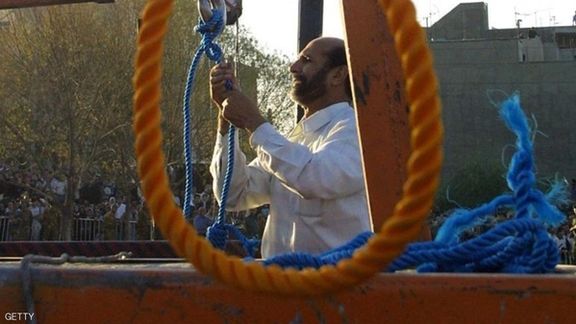
Iran's state media on Saturday reported the execution of an individual allegedly tied to Israel's Mossad intelligence service.
The official IRNA news agency stated that the individual had been actively engaged in communication with foreign services, specifically Mossad, while clandestinely gathering classified information.
The accused, in collaboration with unidentified associates, was said to have supplied documents to foreign entities, notably Mossad. In line with Iran's customary approach to security and political cases, the identity of the executed individual was not disclosed, posing challenges for independent verification.
According to IRNA, the executed individual had provided classified information to a "Mossad officer" with the alleged intention of disseminating propaganda for groups and organizations opposed to the Islamic Republic. The specific location of the purported information transfer was not detailed, and the timing of the operative's arrest remained unclear.
The execution took place in a Zahedan jail in the southeastern Sistan-Baluchistan province and coincided with a recent attack by Sunni militants on a police station in the same region. The attack resulted in the death of 12 security personnel, with several others sustaining injuries. A state funeral for the victims unfolded in the town of Rask on Saturday, as reported by state television. Additionally, clashes following the attack led to the reported deaths of two militants affiliated with the Jaish al-Adl group.
Sistan-Baluchistan, a poverty-stricken province sharing borders with Afghanistan and Pakistan, has long been a focal point of confrontations between Iranian security forces and Sunni militants. The province's predominantly Sunni Muslim population stands in contrast to the Shiite majority in Iran, underscoring the complex dynamics at play in the region.
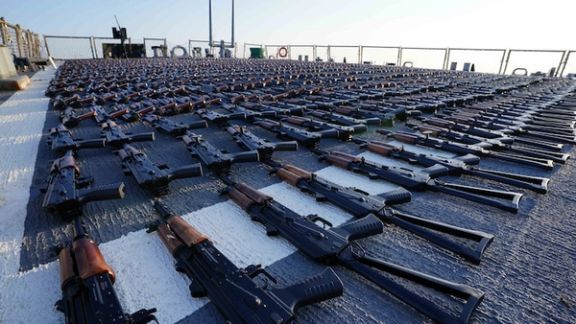
The White House faced mounting questions on Friday as Iran-backed Houthis successfully disrupted global shipping despite the presence of US naval forces in the Red Sea.
Two major shipping and logistics giants, Moller-Maersk and Hapag-Lloyd, announced the suspension of all journeys through the Red Sea in the wake of Houthi attacks on their vessels.
For weeks, the Yemeni Houthi rebels have been targeting and harassing ships with minimal response from the US, underscoring concerns about the Biden administration's apparent reluctance or inability to assert its authority in the face of Iran and its proxies.
"I am absolutely stunned that we're still sitting there in a defensive mode," said former Vice Chief of Staff of the US Army Gen. Jack Keane in an interview with Fox News on Friday. "To shut these people down, you have to take away their capability to do it... You go after the rockets… You go after their entire command and control system… you go after the Iranians because they're really calling the shots here."
Many in Washington are perplexed by what they perceive as the Biden administration's inadequate response to the aggressive actions of Iran and its allies in the region.
While Iranian officials acknowledge their support for the Houthi rebels in Yemen, they emphasize that the group makes independent decisions and acts autonomously. However, it is widely believed that Iran plays a substantial role in their operations.
"While the Houthis are pulling the trigger, they're being handed the gun by Iran," White House National Security Advisor Jake Sullivan stated on Friday. "And Iran has a responsibility to take steps themselves to cease these attacks." However, Houthis began their attack on shipping after Iran's Ali Khamenei last month called for blockading Israel.
The Houthi rebels first declared their intention to halt all transit through the Red Sea to Israel while the Israeli military campaign in Gaza continues. But on December 10, the threat was extended to all shipping. They have been targeting commercial vessels for several weeks, with Friday's attack marking a significant success.
Moller-Maersk and Hapag-Lloyd are global industry leaders, and their decision to avoid the Red Sea could have tangible repercussions on the regional and global economy, particularly if other companies follow suit, further increasing shipping costs.
Approximately 80 percent of global trade is conducted via sea routes, with the Bab-el Mandeb Straits serving as a crucial gateway to the Mediterranean Sea and the Indian Ocean. It plays a pivotal role in maritime access to Egypt's Suez Canal.
Currently, around 12% of global trade transits through the Red Sea, as reported by the International Chamber of Shipping, which has called on nations with influence in the region to intervene and prevent Houthi attacks on ships and sailors.
Last week, US National Security Advisor Jake Sullivan revealed that the Biden administration had reached out to allies to assemble a task force aimed at ensuring the safe passage of ships in the Red Sea.
On Thursday, Iran's Defense Minister, Mohammad-Reza Ashtiani, issued a warning to the US and its allies, suggesting that such a force would encounter "extraordinary problems." Regarding the Red Sea crisis, he asserted, "Nobody can make a move in a region where we have predominance."
Critics of President Biden's Iran policy argue that it has contributed to the current situation by lack of resolve to confront Iran, jeopardizing American interests and emboldening the Iranian regime and its proxies.
"There would be no Houthis without Iran, there would not be Hamas without Iran, there would not be Hezbollah without Iran," asserted US Presidential candidate Nikki Haley in an interview with Fox News on Friday. "If we really want to do something, why doesn't Joe Biden reimpose the sanctions on Iran that were already in place? Deliver a significant blow, and they will back down."
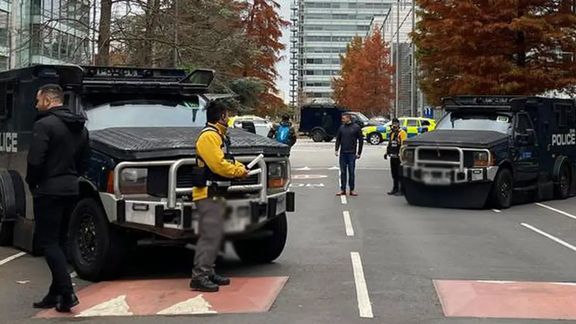
A man accused of committing a terror offence by spying on Iran International's London headquarters has claimed he was filming in the area because he was “in wonder” at the architecture.
Magomed-Husejn Dovtaev (Mohammad-Hussein Dovtaev), a Chechen-born resident of Austria, was arrested by officers from the Metropolitan Police Counter Terrorism Command at Chiswick Business Park in February.
Explaining why he had recorded a video of the area on his phone, he told the Old Bailey he "just liked" the building at the business park and was "in wonder" at the architecture.
Prosecutors allege that he tried to collect information about the Iran International’s office by taking photographs and videos.
A single charge has been filed against him for his attempts to gather information "likely to be useful to a person committing or preparing an act of terrorism." Dovtaev has pleaded not guilty to the charge. The trial is expected to conclude next week.

Dovtaev, 31, has claimed that his brother had sent him to Britain to investigate individuals who had stolen money from their father.
He told the jury that his father had been involved in the Chechen opposition and fled to Austria in 2004 when his uncle had been kidnapped by the Russians.
He claimed his father had invested 20,000 euros with Russian-speaking fraudsters, and he was sent to Britain by his brother to investigate who had taken the money.
Police released footage on Thursday of Dovtaev arriving at Gatwick airport and taking a taxi directly to Chiswick Park near the former Iran International headquarters.
Iran International became a target for retaliation following its reporting on Mahsa Amini's death in custody in Iran last year and subsequent protests in the country, according to prosecutor Nicholas de la Poer.
Iran's Intelligence Minister declared Iran International a terrorist organization later on, de la Poer said, which caused its employees to "became targets for violent reprisals".
In November 2022, Volant Media, the parent company of Iran International, said that two of its journalists had been notified of direct threats. It said in a statement the Metropolitan Police had formally notified both journalists that these threats represented an imminent, credible and significant risk to their lives and those of their families. Following the significant escalation in Iranian state-backed threats and advice from the London Metropolitan Police, Iran International TV announced in February that it reluctantly and temporarily closed its London studios and moved broadcasting to Washington DC. After months of hiatus in broadcasting from the UK, the network relaunched operations from a new London building in September.
Faced with nationwide antigovernment protests since mid-September, the Islamic Republic has blamed foreign-based Persian broadcasters such as the BBC Persian and Iran International of “fomenting unrest”, while all media in the country are under tight government control and present protesters as “rioters” and “terrorists”.According to Iran’s Intelligence Minister Esmail Khatib, the Islamic Republic regards Iran International as “a terrorist organization.” He has stated that its staff and anyone affiliated with the channel will be pursued by the Ministry of Intelligence all over the globe, reiterating threats to “punish all those” who had a role in popular protests against the regime, wherever they might be.
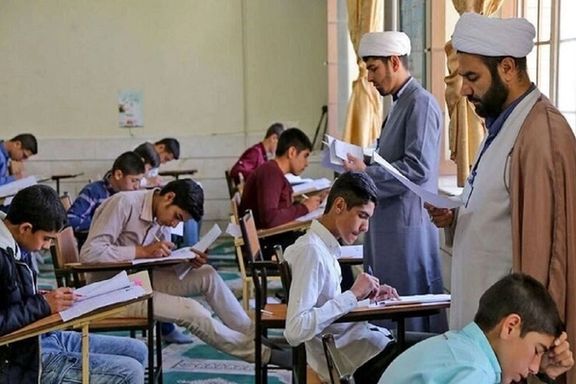
Iran's deputy education minister, Hamid Nikzad, has announced that seminary-affiliated schools will be established as part of the ministry's "Mosque, School, and Home" program.
Nikzad did not provide further details regarding the project but expressed hope that it will lead to "promoting Iranian-Islamic culture."
Some ministers in President Ebrahim Raisi's hardline administration had earlier stressed the "revolutionary" nature of the education ministry.
Iran's seminaries and the Ministry of Education have been also actively working on another plan called "Amin" which was initially limited to the religious city of Qom but has now extended to other cities.
As part of this project, it was announced that now 21,000 seminary graduates have been recruited to teach in 7 thousand schools.
Also, on Thursday Reza Morad Sahraei, the Minister of Education said that three thousand seminary graduates as well as a group of "Jihadi forces" have been recruited into the education system this year.
He stated that the purpose of the move was to "strengthen the religious foundation of the students".
The integration of religious teachers happens against the backdrop of a “purge” in the education system. In September, it was reported that Iran's Minister of Education had replaced over 20,000 principals.
The "transformation plan," was implemented after many students took part in anti-government demonstrations in 2022.
Later, Sahraei denied allegations about the purging of certain administrators by stating that some are retiring while others are being replaced by new people.
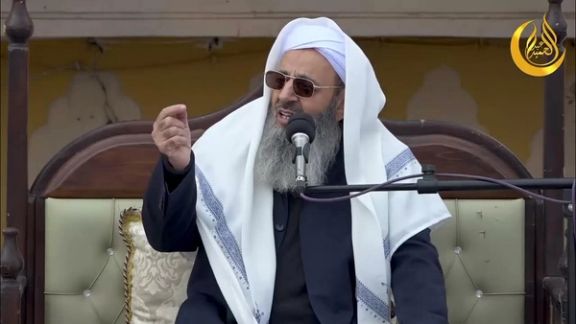
Iran's Sunni leader Mowlavi Abdolhamid has condemned a deadly attack on a police station allegedly carried out by a Sunni militant group.
At least 12 officers were killed and seven injured in the attack on the police station in Rask said to have been carried out by militant group Jaish al-Adl.
Speaking in his Friday sermon after the incident in the city in Iran's Sistan-Baluchistan Province, Mowlavi Abdolhamid said "We must ensure that the security of the province and our safety are not compromised."
Abdolhamid, the Friday prayer in Zahedan, the provincial capital of the Sunni-majority Sistan-Baluchestan, has been a vocal critic of Iran's Shiite-led government and has urged tolerance towards minorities.
In July, the Jaish al-Adl group attacked a police station in Zahedan which they claimed was involved in the killing of approximately 90 civilians on September 30, 2022, a day dubbed "Bloody Friday." Security forces shot at worshippers protesting against the government after Friday prayers. The massacre took place amid widespread demonstrations across Iran following the death of Mahsa Amini in the custody of the hijab police.
There have been rallies in the Sunni-majority city since then, following the sermons delivered by the Friday prayer leader.
Although no trial has been held for the perpetrators of the protester killings, several Baloch protesters accused of attacking security forces and law enforcement have been executed.
Iran's southeastern province of Sistan-Baluchistan is one of the most economically depressed regions.
The province is primarily populated by Baluchs, most of whom are Sunnis. Their execution rate has historically ranked among the highest among Iran's minorities.
On Saturday the UN Special Rapporteur on Iran said the levels of killings, torture, and brutality against the Baluch minority in Iran are “shocking”
In his last report to the United Nations, Javaid Rehman pointed out that are disproportionately targeted and executed in the Iranian criminal justice system, Baluchis.